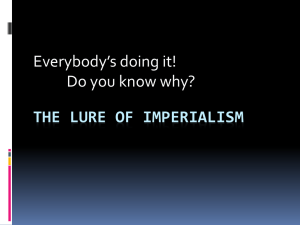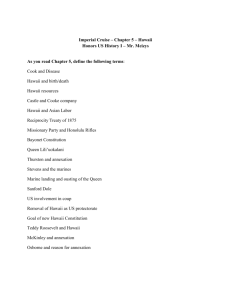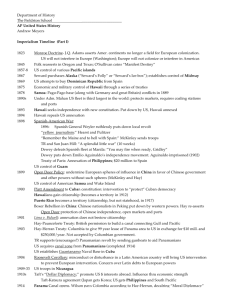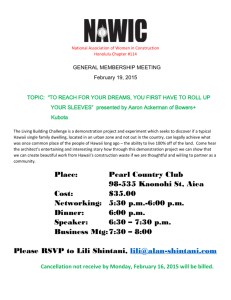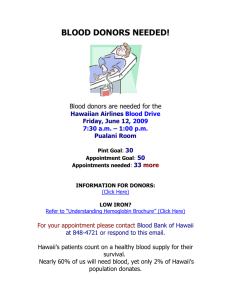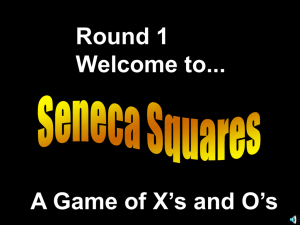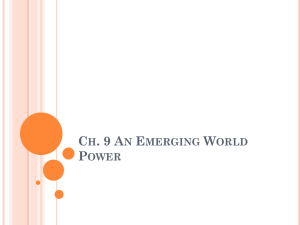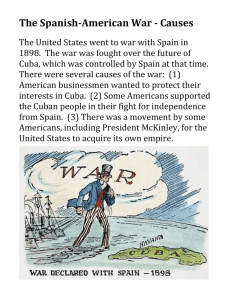American Expansionism 2
advertisement
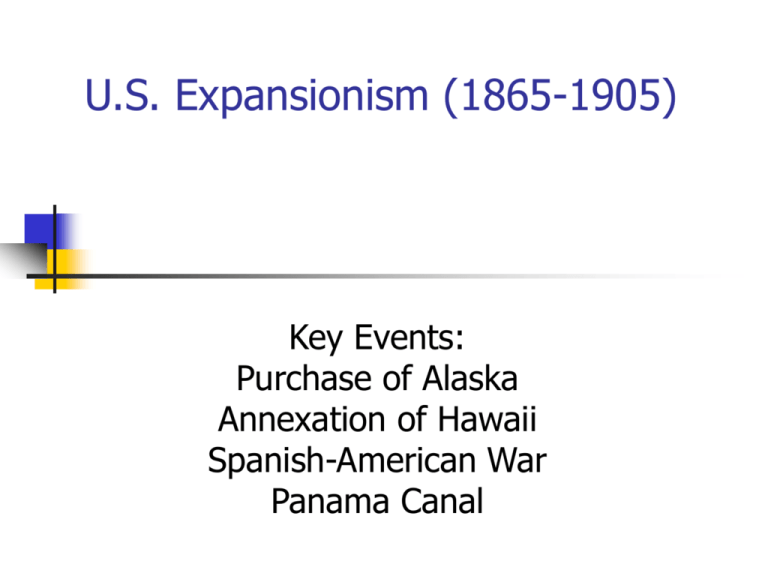
U.S. Expansionism (1865-1905) Key Events: Purchase of Alaska Annexation of Hawaii Spanish-American War Panama Canal Driving Forces Behind Expansion Manifest Destiny God-ordained right to expand U.S. Originally applied to contiguous 48 states “Sea to shining sea” expansion Closing of the Frontier Social Darwinism during Industrial Revolution Expanded to Western Hemisphere Industrial Revolution Manufactured Products Military Power Increasing American Foreign Policy Isolationism Definition – Policy that stresses national selfsufficiency and freedom from foreign alliances President Washington’s Farewell Address Policy toward Europe Civil War Undemocratic and untrustworthy Never applied to rest of the world Monroe Doctrine Monroe Doctrine Foreign policy statement issued in 1823 U.S. would not tolerate European interference in the Western Hemisphere Originally no means to back it up Involved matters of trade with Latin America Became important statement once U.S. developed naval strength after Civil War Led to U.S. domination of the affairs of the Western Hemisphere Imperialism Definition: 1) Practice of establishing and controlling colonies; 2) domination by one country of the political, economic, cultural affairs of another country Imperialism (cont.) Reasons (selfish): Access to raw materials and resources Markets for manufactured products Increased national pride Reasons (justification): Christianize savage people Civilize savage people Protect and bring technology to savage people Purchase of Alaska Purchased from Russia in 1867 $7.2 Million for 600,000 square miles Two cents/acre for area more 2X Texas Seward’s Folly William H. Seward, Secretary of State Block of ice Bargain Rich in natural resources (lumber, copper, gold, oil and natural gas Alaska and the United States Hawaii First contact with Hawaii by New England whalers and traders in late 1700s Christian Missionaries arrive in the 1800s In 1840, King Kamehameha models constitution after that of the U.S. Importance of Sugar By 1865, missionary families dominated sugar production 1875 Treaty Most of the sugar was sold to the U.S. Hawaiians sugar enters U.S. tariff-free Hawaii will give no territory or special privileges in the islands to any other country Sugar producers est. plantations using Japanese laborers McKinley Tariff (1890) Removed Hawaiian sugar tariff-free status Led to depression in Hawaii Annexation of Hawaii Queen Liliuokalani becomes ruler in 1893 Americans organize revolution “Hawaii for the Hawaiians” Absolute Monarch Marines ordered ashore from warship in Honolulu harbor Queen Liluokalani “persuaded” not to resist Revolution successful; American flag raised Revolutionary government headed by Sanford Dole Debate over annexation President Cleveland withdrew annexation treaty from Senate Cleveland wants control returned to “Queen Lil” Dole refuses and declares Hawaii a republic on July 4, 1894 Annexation of Hawaii (cont.) Impact of Spanish-American War Hawaii strategically located as war is fought in the Philippines Hawaii is annexed by the U.S. in1898 Hawaii becomes a territory of in 1902 Hawaii becomes 50th state in 1959 U.S. Territorial Expansion since 1803 Spanish-American War Guerilla War between Spain and Cuba begins in 1895 Cuban patriots sought independence Burned sugar cane fields, blocked RR, ambushed, etc.. Led by Jose Marti Marti’s writings win tremendous sympathy in U.S. Cuba is Spain’s last important imperial possession in the Western Hemisphere Cubans herded into concentration camps U.S. Presidents Cleveland and McKinley urging Spain to give Cubans more say in the government Explosion of the Maine In 1898, McKinley sends U.S.S. Maine to Havana harbor Maine explodes killing 266 sailors – February 15, 1898 Protect U.S. citizens due to rioting in Havana Spain exploded it with underwater mine Faulty wiring caused Maine’s ammo to explode Cuban rebels exploded it knowing Spain would be blamed U.S. exploded it so there would be reason to go to war War Fever in the U.S. – Remember the Maine!!! Declaration of War McKinley did not want war Spanish government Civil War veteran who knew the cost of war Could not surrender Cuba Congress wanted war McKinley asks for declaration on April 11, 1898 Teller Amendment Spain breaks off relations = war Role of Yellow Journalism Definition: Sensationalized journalism with the goal of calling attention to wrongdoing and selling newspapers Yellow Journalism in Spanish-American War Concentration camp conditions and the Maine Joseph Pulitzer and William Randolph Hearst Influence in leading U.S. to war? Latin America Cont. Roosevelt Corollary Expanded the Monroe Doctrine the Monroe Doctrine would now consider Latin America as an agency for expanding U.S. commercial interests in the region, along with its original stated purpose of keeping European hegemony from the hemisphere Panama Canal Prime example of Roosevelt’s “Big Stick” foreign policy Dollar Diplomacy President Taft The U.S. wanted to further its foreign policy aims in Latin America and East Asia through use of its economic power. Missionary Diplomacy President Wilson Wilson felt morality should guide all conduct America's mission was to foster peace, human rights, and social progress in the world.
